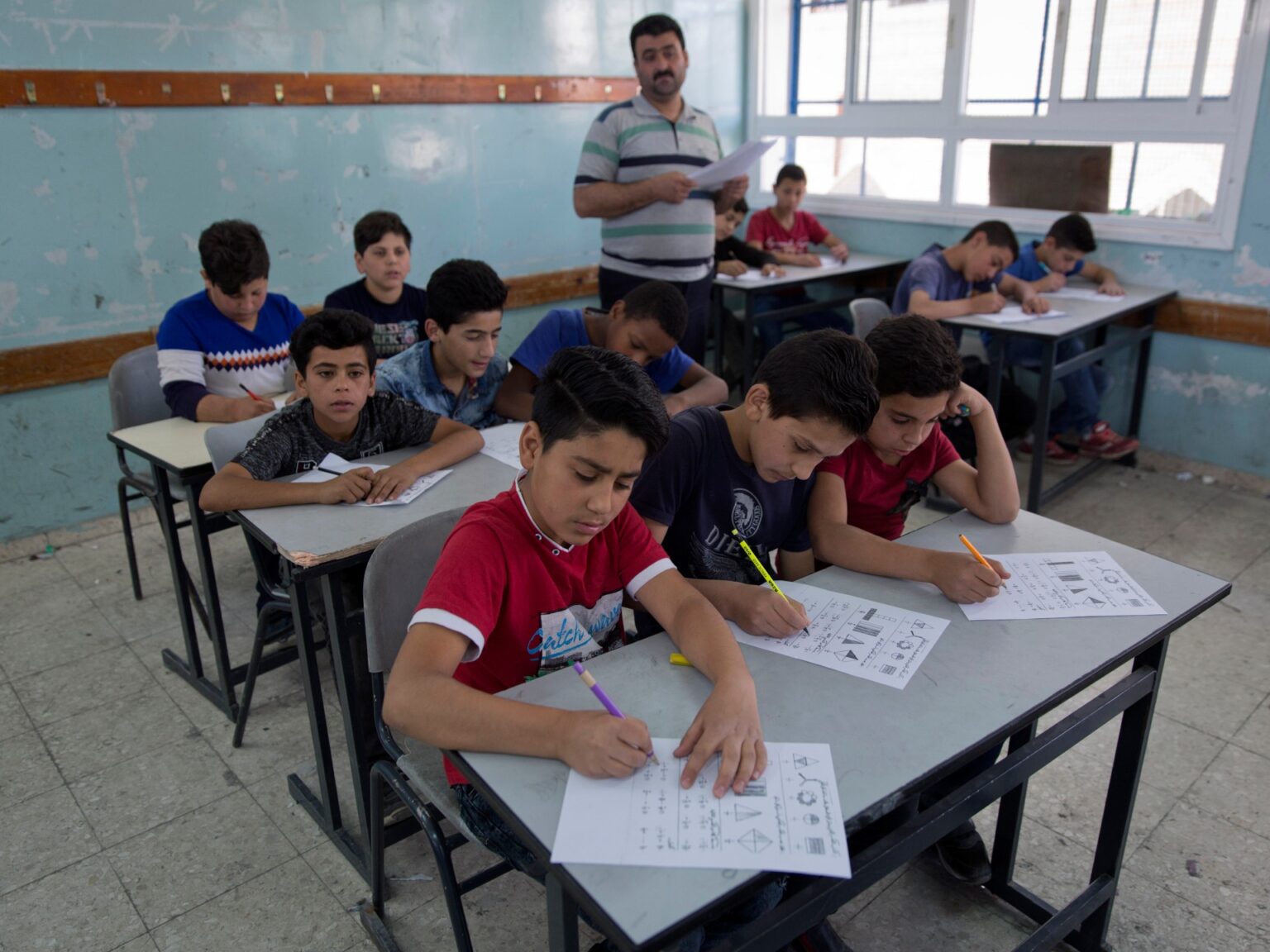Global Courant 2023-05-11 19:42:21
Jubbet adh-Dibh, occupied West Bank – Ten-year-old Omar Salah was unable to attend school on Sunday as Israeli troops demolished the building after the building was not granted planning permission.
Before 4 a.m., Israeli soldiers lined up at the primary school in Jubbet adh-Dhib with bulldozers, trucks and army vehicles. By the time Omar arrived in his school uniform, the school he knew had already disappeared.
Parents and children woke up to the sound of bulldozers and ran to the school, in a frantic effort to prevent the demolition, some throwing stones to scare off the bulldozers.
“The soldiers came to the village and started shooting the parents and children with bullets, tear gas and sound bombs,” Omar said a few hours later, still stunned.
Fifty villagers were injured and one community member lost an eye from a rubber bullet. “Everyone is upset,” Omar said later that morning. “My siblings were crying.”
Omar stared listlessly at the spot where his school had once stood. All that remained were mounds of dirt and puddles of water from broken water pipes. Children wandered aimlessly while parents bandaged rubber bullet wounds met to figure out what to do.
Musa Salah examines what remains after the school destruction in Jubbet abh-Dibh in the occupied West Bank on May 7, 2023 (Steven Davidson/Al Jazeera)
“(Bezalel) Smotrich said he wants to wipe out Huwara; this is what extermination means,” said Musa Salah, Omar’s uncle, referring to Israel’s far-right finance minister. Smotrich heads the Israeli Civil Administration (ICA), which administers Area C, the area of the occupied West Bank under Israeli civil and security control. Ninety percent of Jubbet adh-Dhib is in this zone.
Salah and his family had donated seven dunums (0.7 hectares or 1.73 acres) of land to the community to build a school. A previous school there was demolished just before the start of the 2017 school year, but was rebuilt with donations from several countries of the European Union, so that 66 first to fourth graders could receive an education.
“This is a new tactic they want to wipe us out,” Salah said, gesturing to the cleared spot. “They don’t want to leave a trace.”
Demolish 20 schools 36 times
According to a May 3 report from the Office of the United Nations Special Coordinator for the Middle East Peace Process, a 2.4 percent population increase among Palestinians means that 600 new schools will be needed by 2025. But the number of open schools lags far behind that number. . Hampered by funding issues and the ICA, only 68 have been built as of 2020 – with many subsequently scrapped.
According to the UN, there have been 36 vandalisms of 20 schools in occupied East Jerusalem and the West Bank since 2010.
According to the West Bank Protection Consortium, a partnership of nearly a dozen European states and several NGOs, two schools have been demolished in the past year and school building materials have been seized six times since 2020. .
Individual cases vary, but a lack of building permits is often cited as a reason for school demolitions.
It is almost impossible for Palestinians to get building permits in Area C, where there is only a 2 percent success rate. After the demolition in Jubbet adh-Dhib, there were 57 schools in the West Bank and East Jerusalem, educating 6,550 children about to be demolished. Seven of them have exhausted all legal options to postpone their destruction.
Since Israel’s right-wing government took office in late 2022, demolitions have increased significantly. Recent UN statistics show a 42 percent increase in all vandalism this year compared to a similar time frame last year.
A closing window of protection
Even before the current Israeli government, changes in the administrative process and military legislation made the process of carrying out demolitions in the West Bank easier and faster.
Wa’il Qut — a lawyer with the Jerusalem Legal Aid and Human Rights Center, which oversees the cases of 21 schools slated for demolition — said a 2018 military order allows the ICA to building within 96 hours.
Students enter a makeshift classroom in Jubbet adh-Dibh after the initial demolition of their school in August 2017 (File: Nigel Wilson/Al Jazeera)
The planning application process became even less likely when jurisdiction for demolition cases in the West Bank was shifted from the Supreme Court to the more partisan and right-wing District Court of Jerusalem.
This development and other recent changes in military policy have resulted in building permit applications being rejected much more quickly, taking two or three weeks, when once it could take months or more than a year, Qut said.
“The window for providing legal protection is sadly getting narrower by the day,” said Qut.
While military policies prior to the current Israeli government set the tone, Qut said he has noticed changes in the ICA’s behavior since Smotrich took over. Lawyers and community members also noted that the pro-settler group Regavim is working more closely with ICA than ever before.
Smotrich co-founded Regavim, which targets Palestinian properties in the occupied West Bank for demolition.
“Even the composition of the committees working in the Israeli civilian administration now consists of settlers living in illegal settlements in the West Bank,” said Qut, who noted a dramatic increase in vandalism, work stoppages and evictions. and confiscation orders this year compared to 2022.
Regavim sued the Israeli civil administration in 2018 to demolish the school in Jubbet adh-Dhib. Efforts stalled, but shortly after Smotrich took control of the ICA this year, the demolition orders went through.
“Smotrich sued the government of which he is a member and is clearing the case,” Salah said.
Forced transfer
Community and NGO leaders see another reason for the increase in school vandalism lately. While displaced Palestinians in Area C often rebuild their demolished homes with cheap materials such as scrap metal, rebuilding a school is not an easy task and poses an existential problem for poor rural communities.
“We often see that once a school is removed, families are very likely not to stay because their children cannot get an education,” said Jason Lee, Save the Children country director in the Palestinian territories.
A primary school in Ein Samiya east of Ramallah, also funded by donors, opened in January 2022. The remote population of Bedouin herders in Ein Samiya had declined by 31 percent since 2000 due to threats of eviction and harassment from nearby settlers – many of whom live in outposts built without a permit.
The new school has been a bright spot for the small community. According to head teacher Ghada Barakat, the school has created a classroom for three girls aged 12 to 14 who had not attended school before, where they learned basic skills such as reading and writing, in addition to essential life skills.
(Al Jazeera)
But shortly after the completion of the school, demolition orders came. A year later and with all legal avenues exhausted, demolition can be expected any day after the ICA investigated the school last week. The demolition of remote schools such as Ein Samiya particularly threatens the education of girls, who are at greater risk of dropping out or marrying early.
Before the school was built, students had to travel to Ras el-Tin, 9 km away, or to Kafr Malik, 15 km away, both difficult to reach in the mountainous area. The students were also frequently attacked by soldiers and settlers on their way to and from school.
The children of Ein Samiya often ask their English teacher, Amani Salameh, if the school will be demolished, fearing they will have to stop or return to the perilous journey to schools much further away. “We tell the kids it won’t be torn down so they can feel safe here,” she said.
Khader Salam, who has three children in Ein Samiya school, remembers that he had to take them to Kafr Malik every morning and pick them up in the afternoon before this school was built.
“Our only hope in this community is for children to go to school,” said Salam, who was unable to work while making the trek to and from Kafr Malik. “With the demolition of the school, our children will drop out, and … it will affect the whole family structure.”
Muhammad Zawaharah was beaten and pushed to the ground during the demolition in Jubbet adh-Dhib (Steven Davidson/Al Jazeera)
A call to action
Mohammad Zawaharah, 75, was tired but angry. He had been beaten and pushed to the ground the morning soldiers destroyed the school in Jubbet adh-Dhib. The army has already demolished one of his houses in the village, and the other is still scheduled to be demolished, along with almost the entire village.
“They have no mercy. This is criminal. This is a school for small children, my grandchildren,” said Zawaharah. “They are doing this so that we leave. But where do they want us to go? To Ukraine? This is my country, my home.”
Humanitarian aid workers and community members call on the international community to end these acts of destruction, which are illegal under international law, and to protect children’s right to education, as enshrined in the UN Convention on Human Rights the 1991 rights of the child, which Israel signed to.
When they heard of this imminent destruction, caravans of diplomats and donors came to show their solidarity and left after about an hour. Some diplomatic missions have tweeted their urgent concerns about human rights violations, but otherwise little is being done publicly.
“We would like to see actions move beyond condemnation toward tangible actions that will hold Israel accountable for its violations of international law,” said a spokesman for the West Bank Protection Consortium, who asked not to be identified.
Students walk through Jubbet adh-Dibh to the village primary school, which has now been demolished twice (File: Nigel Wilson/Al Jazeera)
“That is the need here – Israel’s responsibility – because it is the culture of impunity that has allowed this situation to flourish,” the spokesman said.
Without significant backlash from the international community, almost no one expects an ICA, now led by far-right settler interests, to stop the escalating destruction of Palestinian schools and other buildings.
Even in the face of the destruction, communities remain steadfast in their efforts to educate their children. At the donor-funded Isfey School in Masafer Yatta last year, local residents set up tents to continue teaching after the school was demolished. The tents held out for a few weeks before they were confiscated.
On Sunday evenings, the people of Jubbet adh-Dhib also set up tents where the school once stood to continue classes. Twenty-four hours after the demolition, the children were back in class and singing songs.
Omar refuses to give up his education, even though his school no longer has a roof.
“We are going to defend our country and our education,” he said. “We’re going to protect it.”
(TagsToTranslate)News








